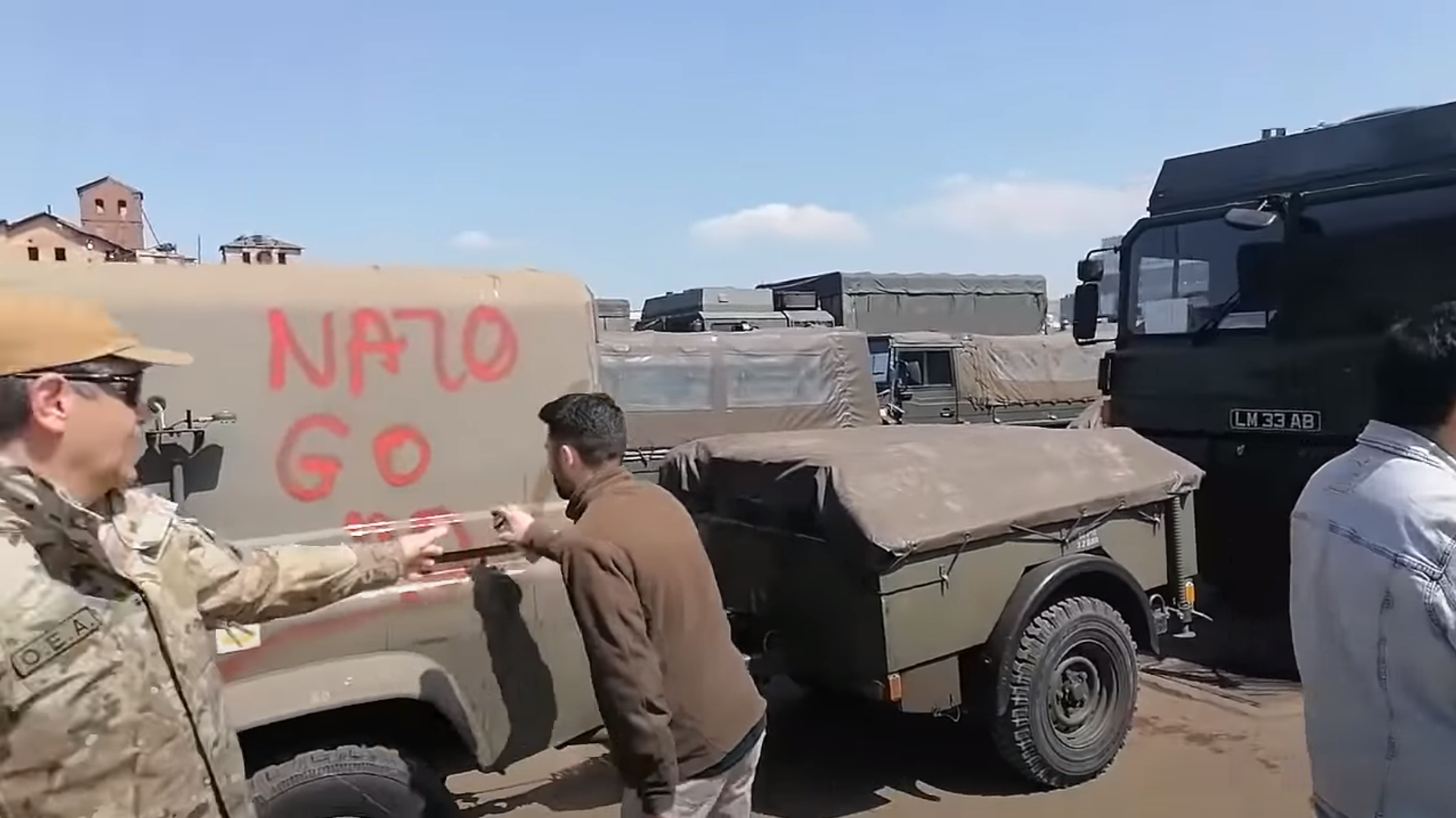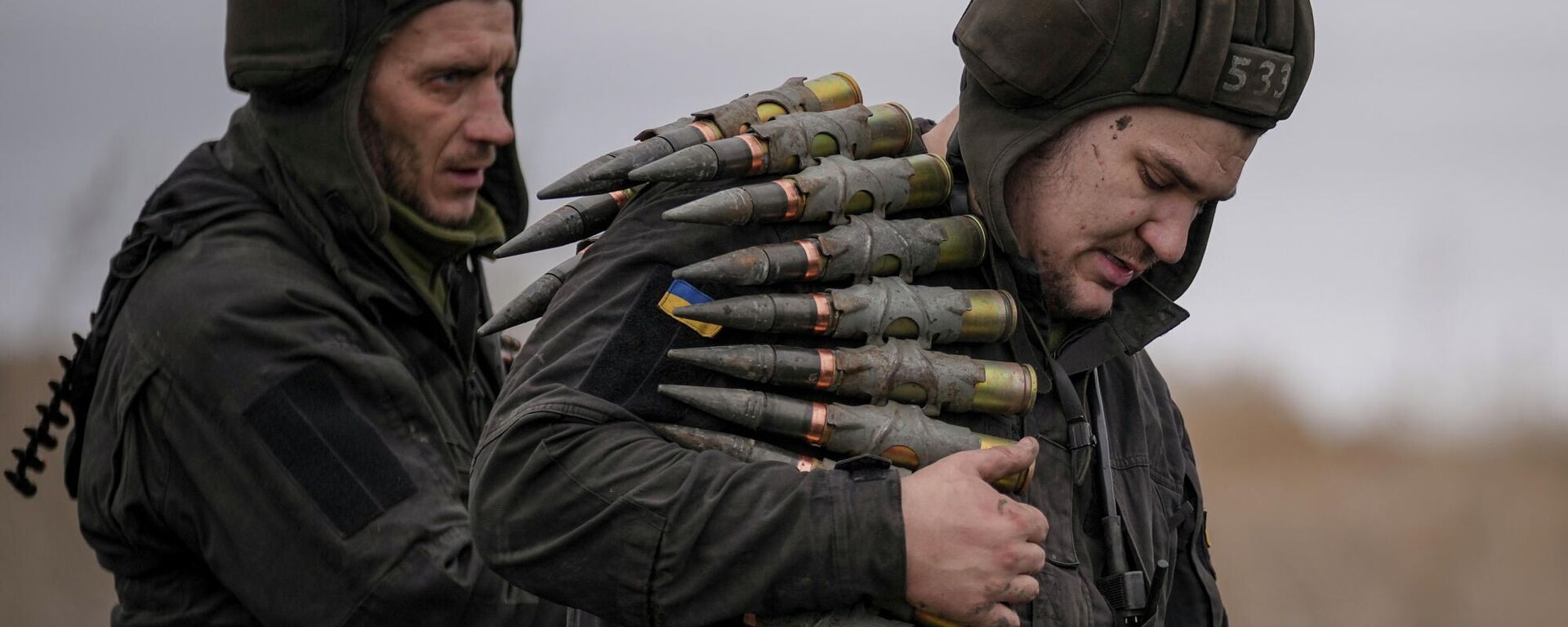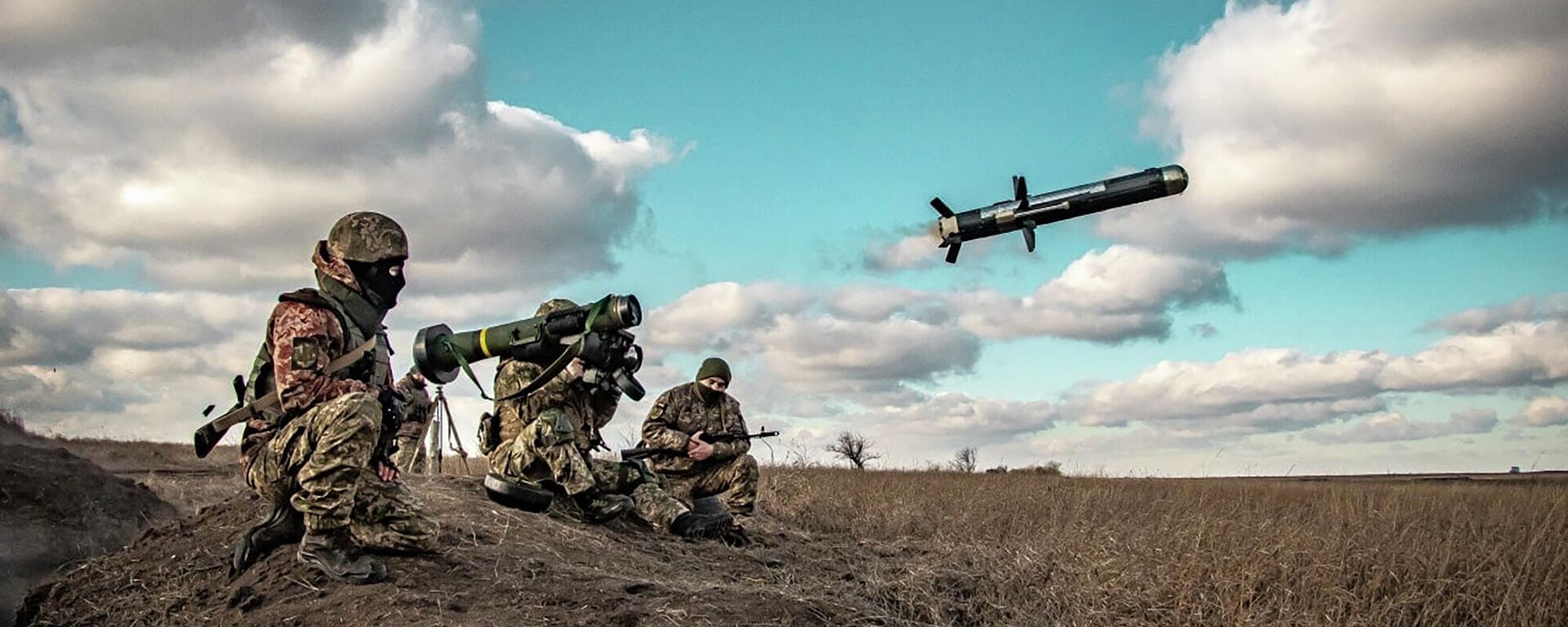https://sputnikglobe.com/20220410/videos-show-protesters-in-greece-trying-to-block-shipment-of-nato-weaponry-to-ukraine--1094644530.html
Videos Show Protesters in Greece Trying to Block Shipment of NATO Weaponry to Ukraine
Videos Show Protesters in Greece Trying to Block Shipment of NATO Weaponry to Ukraine
Sputnik International
Earlier in April, as Western countries funnel weapons shipments to Ukraine, where Russia has been carrying out a special operation to "demilitarise and... 10.04.2022, Sputnik International
2022-04-10T14:23+0000
2022-04-10T14:23+0000
2022-04-10T15:00+0000
russia's special operation in ukraine
greece
ukraine
russia
volodymyr zelensky
joe biden
donetsk people's republic
lugansk people’s republic
https://cdn1.img.sputnikglobe.com/img/07e6/04/0a/1094644801_0:1:1277:719_1920x0_80_0_0_b57c42254032701b46e30b417f5262a9.png
Videos circulating on the internet have shown protesters in the Greek port of Thessaloniki trying to stop the shipment of NATO military equipment to Ukraine on 6 April and even engaging in clashes with the police.The protests, allegedly organised by PAME Greece - All Workers Militant Front, resulted in 8 people being detained, among them PAME members, one journalist and 2 members of the KKE (Communist Party of Greece). Police had resorted to tear gas in dispersing the demonstrations.The events took place on the same day when Greece announced it was expelling twelve Russian diplomats, becoming the latest EU country to join the wave of expulsions linked to events in Ukraine.A defiant unwillingness to be complicit in sending more weaponry to support the Kiev regime was expressed on numerous previous occasions in Greece.Thus, the Hellenic Railways Authority TRAINOSE threatened to fire people after railroad protests in Thessaloniki delayed transfer of American and NATO tanks to Alexandroupolis, a port in the northern part of the country, so that they might then be taken to the border with Ukraine.The demonstrators had refused to “become complicit” in actions, which, as Russia has repeatedly stated, only result in greater loss of life due to weapons supplies from NATO and its allies.Greek trade unions had also intervened, saying they demanded that the country’s railway rolling stock “not be used to transfer the US-NATO arsenal to neighbouring countries.”It was reported by Greek media that the Hellenic Railways Authority TRAINOSE found strikebreakers who agreed to lead the train to Alexandroupoli.This had come after the Joe Biden administration announced it would work with allies to transfer Soviet-made tanks to bolster Ukrainian defences in the country’s eastern Donbass region. The move to help transfer Soviet-made tanks, came in response to a request from Ukraine’s President Volodymyr Zelensky, frustrated at what he viewed as a slow pace of weapons transfers, reported US media outlets.Earlier, a demonstration was organised at the Piraeus port region of Athens, protesting the docking of the French battleship Charles De Gaulle, reported Greek Times. Members of the Greek Communist Party KKE threw paint at NATO ships in the port of Piraeus and “made it clear that NATO ships are not welcome in the port of Piraeus,” according to their statement on 19 March. According to reports, a group of protesters also raised a banner from a boat in the sea near the French battleship which read “stop all interventions”.Protesters had also burned the flag of the North Atlantic Treaty Organization (NATO) on 1 March outside the Russian and American consulates in Thessaloniki, Greece.Russia’s special operation was launched on 24 February in response to a request for assistance from the Donetsk and Lugansk People’s Republics (DPR and LPR), enduring escalating attacks by Kiev authorities throughout an eight-year offensive. The Russian Defence Ministry underscored that Moscow had no plans to occupy the country, with the operation exclusively targeting Kiev’s military infrastructure.
https://sputnikglobe.com/20220409/top-russian-diplomat-in-us-urges-west-to-stop-funneling-weapons-to-ukraine-1094622495.html
https://sputnikglobe.com/20220408/nato-pledges-new-heavier-weapons-to-kiev-as-ukraines-fm-says-donbass-showdown-will-resemble-wwii-1094588768.html
greece
ukraine
Sputnik International
feedback@sputniknews.com
+74956456601
MIA „Rossiya Segodnya“
2022
News
en_EN
Sputnik International
feedback@sputniknews.com
+74956456601
MIA „Rossiya Segodnya“
Sputnik International
feedback@sputniknews.com
+74956456601
MIA „Rossiya Segodnya“
greece, ukraine, volodymyr zelensky, joe biden, donetsk people's republic, lugansk people’s republic
greece, ukraine, volodymyr zelensky, joe biden, donetsk people's republic, lugansk people’s republic
Videos Show Protesters in Greece Trying to Block Shipment of NATO Weaponry to Ukraine
14:23 GMT 10.04.2022 (Updated: 15:00 GMT 10.04.2022) Earlier in April, as Western countries funnel weapons shipments to Ukraine, where Russia has been carrying out a special operation to "demilitarise and de-Nazify" the country, Greek railway protests managed to block a shipment of American tanks to Ukraine for more than two weeks.
Videos circulating on the internet have shown protesters in the Greek port of Thessaloniki trying to stop the shipment of
NATO military equipment to Ukraine on 6 April and even engaging in clashes with the police.
The protests, allegedly
organised by PAME Greece - All Workers Militant Front, resulted in 8 people being detained, among them PAME members, one journalist and 2 members of the KKE (Communist Party of Greece). Police had resorted to tear gas in dispersing the demonstrations.
The events took place on the same day when Greece announced it was expelling twelve Russian diplomats, becoming the latest EU country to join the wave of expulsions linked to events in Ukraine.
A defiant unwillingness
to be complicit in sending more weaponry to support the
Kiev regime was expressed on numerous previous occasions in Greece.
Thus, the Hellenic Railways Authority TRAINOSE
threatened to fire people after railroad protests in Thessaloniki delayed transfer of American and NATO tanks to Alexandroupolis, a port in the northern part of the country, so that they might then be taken to the border with Ukraine.
The demonstrators had refused to “become complicit” in actions, which, as Russia has repeatedly stated, only result in greater loss of life due to weapons supplies from NATO and its allies.
Greek trade unions had also intervened, saying they demanded that the country’s railway rolling stock “not be used to transfer the US-NATO arsenal to neighbouring countries.”
It was reported by Greek media that the Hellenic Railways Authority TRAINOSE found strikebreakers who agreed to lead the train to Alexandroupoli.
This had come after the Joe Biden administration announced it would work with allies to transfer Soviet-made tanks to bolster Ukrainian defences in the country’s eastern Donbass region. The move to help transfer Soviet-made
tanks, came in response to a request from Ukraine’s President Volodymyr Zelensky, frustrated at what he viewed as a slow pace of weapons transfers, reported US media outlets.
Earlier, a demonstration
was organised at the Piraeus port region of Athens, protesting the docking of the French battleship Charles De Gaulle, reported Greek Times.
Members of the Greek Communist Party KKE
threw paint at NATO ships in the port of Piraeus and “made it clear that NATO ships are not welcome in the port of Piraeus,” according to their statement on 19 March. According to reports, a group of protesters also raised a banner from a boat in the sea near the French battleship which read “stop all interventions”.
Protesters had also
burned the flag of the North Atlantic Treaty Organization (NATO) on 1 March outside the Russian and American consulates in Thessaloniki, Greece.
Russia’s
special operation was launched on 24 February in response to a request for assistance from the Donetsk and Lugansk People’s Republics (DPR and LPR), enduring escalating attacks by Kiev authorities throughout an eight-year offensive. The Russian Defence Ministry underscored that Moscow had no plans to occupy the country, with the operation exclusively targeting Kiev’s military infrastructure.




